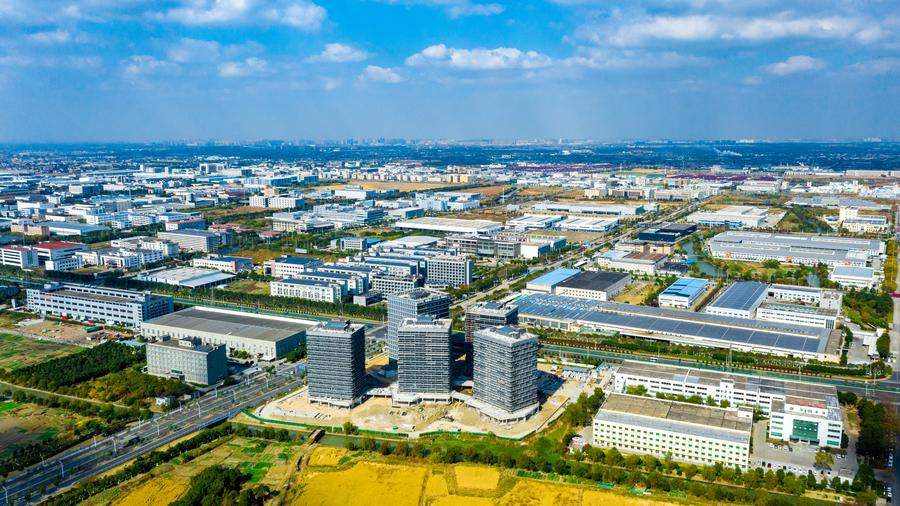Economic Watch: Foreign companies take root in east China

Undated file photo shows the aerial view of Pinghu Economic Development Zone in Pinghu, east China's Zhejiang Province. (Pinghu Economic Development Zone/Handout via Xinhua)
HANGZHOU, March 10 (Xinhua) -- Since the end of the Spring Festival holiday, Shen Yafeng, operation manager at Thermofin Heat Exchanger (Pinghu) Co., Ltd., has been busy overseeing the construction of the company's two new plants.
Upon completion, the company's production area is expected to quadruple, enabling it to efficiently handle substantial orders.
Thermofin is a German-funded enterprise specializing in high-end heat exchangers, and its products are mainly used in indoor ski resorts, high-end cold storage and other industries. In 2018, the company established a factory in Pinghu City in east China's Zhejiang Province.
"At first, we rented a 5,000-square-meter factory in Pinghu economic and technological development zone, hoping to gradually expand in the Chinese market by localizing our production," said Shen, noting that he did not expect the Chinese factory to reach an output value of 20 million yuan (about 2.8 million U.S. dollars) in just a year.
Since then, the annual output value of the company's Pinghu branch has soared, nearly doubling on average every year.
Thermofin's rapid growth in China can be attributed to the strong integrated support of technologies, the market and production capacity. "We have core technologies in rapid cooling and precise temperature control, such as the ability to keep the minimum temperature difference of large cold storage at no more than 0.1 degrees Celsius," Shen said.
"These technologies give us an advantage in the construction, operation and maintenance of high-end commercial ultra-cold storage and data center cooling," Shen added.
Combining cutting-edge technologies with China's efficient and dynamic production capabilities, many foreign companies like Thermofin have opted to expand their investment in the country.
In 2023, Thermofin initiated a plan to build new factories and its Asia-Pacific regional headquarters in China, with an estimated investment of 155 million yuan.
"We chose to acquire land to build a factory while further improving employee training. This proves that we attach great importance to the Chinese production base and the Chinese market," Shen said.
Over the years, the Pinghu economic and technological development zone has attracted over 300 foreign-funded enterprises, with intelligent manufacturing of advanced equipment and biotechnology being the key industries. Many foreign companies have expanded their investments and production here.
In 1994, the Japanese JFE Group ventured into China to invest and establish Zhejiang JFE Shoji Steel Products Co., Ltd. Over the past three decades, the Chinese branch has undergone nine rounds of investment expansion, with the group's total investment increasing 20 times, according to the company.
Maeda Tatsushi, managing director of Zhejiang JFE Shoji Steel Products Co., Ltd., said that in order to adapt to the development trend of China's new energy vehicle (NEV) market, the company invested 34 million U.S. dollars in 2022 to implement a specialized project aimed at achieving an annual output of 20,400 tonnes of motor core stamping parts.
"The project is expected to be put into production in June this year, mainly producing NEV motor core and electric power steering core. It is expected to reach an annual output value of 700 million yuan," said Maeda Tatsushi.
The company's entire chain of raw material procurement and product sales is now concentrated in China. Maeda Tatsushi said that the continuous development of enterprises is more closely integrated with Chinese industries.
"In 2023, our raw materials mainly came from Baosteel and Shougang Group. Regarding our products, 98 percent of the total 80,000 tonnes shipped were sold in China," Maeda Tatsushi added.
According to data from the Pinghu municipal government, in 2023 alone, the city signed 27 foreign investment projects, with a total investment of 2.54 billion U.S. dollars. Its actual use of foreign investment during the period topped 480 million U.S. dollars.
- BRI countries continue to facilitate trade, investment, financial integration: white paper
- Siemens Healthineers to set up new R&D, production base in China's Shenzhen
- GLOBALink | Global entrepreneurs optimistic about China's vast market
- China Development Bank establishes investment with over 40 African countries
- Economic Watch: China steps up policy support to share opportunities with the world


